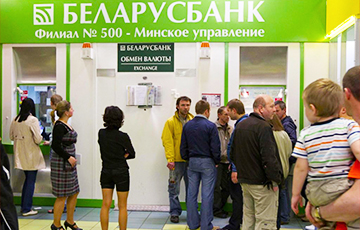Economic Situation in Belarus Is Pre-Default
4- Dmitry Bolkunets
- 19.05.2021, 11:33
- 23,444

Dissatisfaction in Belarusian society has not disappeared.
Political analyst Dmitry Bolkunets explains in the column of forbes.ru why the Kremlin should not support Lukashenko's regime.
No money to repay
The economic situation in Belarus is pre-default. Fitch Ratings has affirmed the country's credit rating at B with a negative forecast. According to the official forecast, the budget deficit for 2021 will reach $2.2 billion - nearly 40% more than expected late last year. The external public debt amounted to $18 billion on April 1, while the internal debt has increased by 19% up to $4.6 billion since early this year. There has been a large-scale write-off of the debts of state-owned enterprises, which were guaranteed by the government. For example, the decision to save Belarusian Steel Works from bankruptcy immediately increased the national debt by $700mln.
Belarusian banks have to assume more and more shares of loss-making enterprises which are unable to pay their debts. Only this January-March, the index of bank books "shares and other types of participation in the capital" has doubled - from 3.87 billion to 7.75 billion Belarusian rubles. For comparison, in February 2016, it was only 0.3 billion Belarusian rubles. The government forces banks to invest in loss-making enterprises. Lack of confidence in the government and falling incomes of citizens caused a mass withdrawal of deposits.
To reduce the risk of bankruptcy, it was decided to increase the capital of Belarusbank (the analogue of the Russian Sber) by about $400 million (1 billion Belarusian rubles). Banks with Russian capital also needed an infusion from their shareholders. The National Bank artificially restrains exchange rates and the refinancing rate not to worsen the already difficult situation of state-owned enterprises with their huge foreign currency debts. For four months, there has been a currency deficit in interbank trading, where less than 10% of the applications for the purchase of foreign currency are satisfied. The scheduled payments on the national debt can cause it. It is why Russian assistance is so important to Minsk.
The currency deficit should lead to a dramatic fall of the Belarusian ruble. In this situation, unpopular steps in banking regulation should be expected. The possibility of issuing foreign currency deposits to the population in rubles according to the exchange rate is being considered. On July 9, Lukashenka's decree will come into force. It introduces currency restrictions for up to one year in case of a threat to the economic security and stability of the financial system of the country. Since all indicators of economic security have already had serious deviations from the norm, restrictions can be introduced at any time. One should not exclude the so-called Cyprus scenario when a lump sum will be deducted from each deposit over a certain amount.
Risks for Russia
The main buyers of the new Belarusian bonds, most likely, will be large Russian banks, but it will be quite a risky investment for them. The U.S. and the EU are increasing sanction pressure on Minsk, and government debt is an obvious target. Several Western investment funds have already announced the sale of Eurobonds of Belarus issued in summer 2020. It is not clear whether secondary sanctions will be applied, but the toxicity of Belarusian companies may lead to a widespread refusal to cooperate with them. The very risk of secondary sanctions already entails negative consequences for the business.
It's especially sensitive for Russian companies supplying oil to Belarusian refineries and European buyers. According to the Argus agency, European banks already refuse to finance deals on sales of Belarusian oil products. The U.S. Treasury Department intends to renew sanctions against nine Belarusian companies from June 3, mainly in the petrochemical industry. However, Belaruskali may also be on the list. In this case, one can expect a fall of hard currency earnings of the country by another 25-30%.
The new package of Russian aid to Minsk is also connected with purely political risks. The Kremlin, having recognized the victory of Aliaksandr Lukashenka in the presidential election of 2020, demonstrated to the Western partners its zone of responsibility. Opposing the change of power through the street coup, Moscow undertook certain obligations to preserve social and political stability in the republic and appeared to be a hostage of earlier decisions. Over and over, the Belarusian leader proved his status as an incapable partner. Despite the support, Lukashenka refuses to fulfil his promises to Putin and update the constitution and carry out political reforms. Meanwhile, the discontent in Belarusian society has not disappeared. It may surface with even more dire consequences at any moment.









